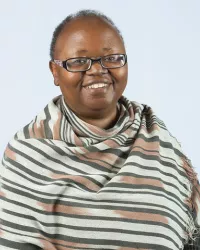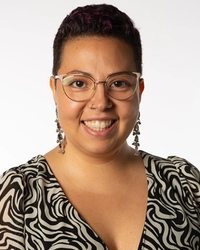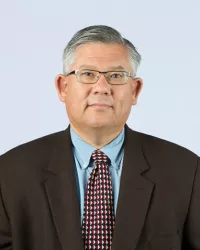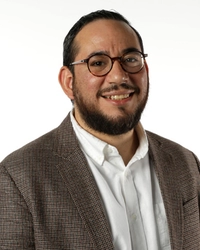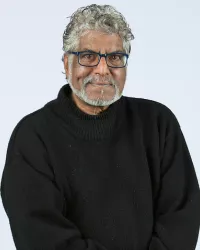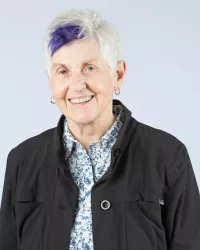Betty Wambui
Associate Professor and Department Chair
268 Fitzelle Hall
607-436-2378
Betty.Wambui@oneonta.edu
Betty Wambui, Ph.D. is Associate Professor in the Africana and Latinx Studies Department at the State University of New York - Oneonta. A Carnegie Diaspora Fellow (2021) and UUP/SUNY Drescher Recipient (2014/15), she received her Ph.D. in Philosophy from Binghamton University (SUNY), USA; and her M.A. in Philosophy from the University of Nairobi, Kenya. Her areas of specialization within Social and Political Philosophy include African Philosophies, Feminist Philosophies, Critical Race Theories and Critical Legal Studies. She has a particular interest in social contract theory, discrimination, and morality. A member of the Women's Caucus of the African Studies Association and former co-convenor; she also served as President of the New York Africana Studies Association. Executive Editor of Praxis: Journal of Gender and Cultural Studies; her publications include - “Feminist Biographies – Telling our Stories” in Gender and Sexuality in Kenyan Societies (Besi Muhonja and Babacar M’Baye, Eds.) Lexington –2022; “Eastlands, Nairobi: Memory, History, and Recovery” in A Tapestry of African Histories: With Longer Times and Wider Geopolitics, (Nicholas Githuku, ed.) Lexington, 2021; "Buffeted: Women, knowledge and the environment – Developing an Afro Feminist Response to Environmental Questions" in African Philosophy and The Epistemic Marginalization of Women, (Jonathon Chimakonam, Thaddeus Metz and Louise du Toit, eds.) Routledge, 2018; “Arrow of God: An Exploration of Psycho-Social and Political Health” in Illuminations on Chinua Achebe: The Art of Resistance (Micere Githae Mugo and Herbert G. Ruffin II) Africa Press, 2017; “Conversations: Women, children, goats and land” in Listening to Ourselves: A Multilingual Anthology of African Philosophy (Chike Jeffers, ed.), SUNY Press, 2013; and “The Challenge of Provenance: myth, histories and the negotiation of socio-political space” in Phoebe: An Interdisciplinary Journal of Feminist Scholarship, Theory and Aesthetics Volume 19, Number 2 – Fall 2007.
Forthcoming –
“On Ngugi wa Thiongo’s Tongue and Pen” in Social Sciences Decentered (Stéphane Dufoix and Marcelo Rosa, Eds.) The Sorbourne University Press – Forthcoming 2023 (Invited)
Maria Chaves Daza
Associate Professor
265 Fitzelle Hall
607-436-3487
Maria.ChavesDaza@oneonta.edu
Bio: Maria Paula Chaves Daza is a Latinx feminist scholar, holds a Master in Philosophy from the Philosophy, Interpretation and Culture program, and has a Doctorate in English from the Department of English, General Literature, and Rhetoric at SUNY-Binghamton University. Born in Colombia, they had the privilege to live in large immigrant cities like Miami and Chicago. These immigrant communities and the matriarchs of their family have given them the perspective and exposure to quotidian feminist practices which inspire their scholarly and community work. Their scholarship is invested in listening to the many ways women of color tell stories and work towards social justice. Their areas of specialization are 20th Century Chicanx/Latinx Literature, Women of Color Feminist Literature/Theory, Transnationalism, Testimonio, Post-colonial/De-colonial Theory.
Robert Compton
Professor
287 Fitzelle Hall
607-436-3048
Robert.Compton@oneonta.edu
Dr. Robert Compton (Ph.D., SUNY Binghamton), works on issues of political development and political economy focusing on Southern Africa and East Asia. He participated in the Ghana program, developed a South Africa short-term study program and provided consultancy for democracy and institution building in Zimbabwe and Uganda working with civil society, students, and parliamentary staff. He has taught at the University of Zimbabwe (2008) as a Fulbright Scholar and made invited presentations on academic unionism at the University of KwaZulu-Natal (UKZN) throughout Southern Africa. Born in Japan, he speaks Japanese fluently and has a bi-cultural/bi-racial background. Professor Compton is one of the ‘go to’ resources regarding career planning in the department. He is the chair of the Department of Africana and Latino Studies.
Dr. Compton teaches African Politics; Politics of Developing Nations; China, Japan, and Korean Politics; Race, Gender, Class and Culture; and International Political Economy regularly. Compton created the Social Justice minor, the first of its kind, in the SUNY system as part of the ALS offerings. He is currently the Vice President for Academics, United University Professions, Oneonta Chapter, a union for faculty and professionals.
Recent publications
Comparative Regional Integration in SADC and ASEAN: Democracy and Governance Issues in Historical and Socio-Economic Context,” in Regions and Cohesion, vol. 3, #1, Spring, 2013: 5-31.
“Gendering the Impact of Zimbabwe’s 2008 Economic Collapse: Tales of Reality on the Ground,” forthcoming in Praxis: Journal of Gender and Cultural Critique.
“Globalization and Changing State Legitimacy in South Africa and Japan,” in Imagining Globalization, eds. Leung, Ho Hon, Mathew Hendley, Robert Compton, and Brian Haley, (Palgrave-MacMillan, 2009).
Imagining Globalization, eds. Leung, Ho Hon, Matthew Hendley, Robert Compton, and Brian Haley, (Palgrave-MacMillan, 2009).
“Dynamics of HIV/AIDS in China and India: Assessing Governmental Response,” in HIV/AIDS and the Threat to National and International Security, ed. Robert Ostergard, (Palgrave-MacMillan, 2007), pp. 223-40.
Roberto Rincon
Assistant Professor
266 Fitzelle Hall
607-436-3078
Roberto.Rincon@oneonta.edu
Dr. Roberto Rincon completed his Ph.D. in Political Science from the University of Illinois at Chicago. He earned a B.A. in Philosophy and an M.A. in Political Science from Northeastern Illinois University. Dr. Rincon’s research and teaching interests include 20th and 21st century Racial and Ethnic Politics in Latin America, Afro-Mexican Studies, Latinx Studies, Postcolonial Theory, and Latin American Political Thought. His current manuscript, Migrating Identities: A Study of Afro-Mexican Racial Formation Within and Across National Borders is a multi-sited and multi-disciplinary ethnography on how trans-border migration shapes the ways in which Afro-Mexicans from the Costa Chica region negotiate, perform, and articulate their multiple subjectivities as Black, Mexican, and Mestizos as they migrate within Mexico and to the United States. His article, “Race, nation, and migration: An analysis of black racial identification among Afro-Mexicans in Winston-Salem, North Carolina” (2025) was published in Latino Studies. Roberto is a Chicano-Mexicano, born in the southeastern region of Mexico and coming of age in Chicago’s northside neighborhoods of Ukrainian Village and Humboldt Park.
Jalen Thompson
Assistant Professor
607-436-3441
Jalen.Thompson@oneonta.edu
Remi Alapo
Adjunct Lecturer
Remi.Alapo@oneonta.edu
Erik Mangrum
Adjunct Lecturer
Erik.Mangrum@oneonta.edu
Regina Nguyen
Adjunct Lecturer
Regina.Nguyen@oneonta.edu
Affiliated Faculty
Brian Haley
144 Physical Science Building
607-436-2001
Brian.Haley@oneonta.edu
Dr. Brian Haley is a cultural anthropologist who completed his B.A., M.A., and Ph.D. degrees in anthropology at the University of California, Santa Barbara. He joined our department in the Fall 2000 semester and is currently a Full Professor. Before joining our department, Dr. Haley was Visiting Assistant Professor of Anthropology at the University of California, Riverside, and Post-doctoral Research Anthropologist at the University of California Institute for Mexico and the United States.
Dr. Haley's teaching and research addresses how ethnic, racial, and national identities form and change; the social and cultural consequences of capitalist agriculture, Mexican immigration, globalization, and tourism; and the application of anthropology to practical issues such as immigration, heritage management, and ethnic relations. He has conducted ethnographic research in rural communities in California recently made multiethnic by Mexican farm worker immigration, ethnohistorical research on the original Spanish colonists of California and their descendants, and ethnohistorical and archaeological research on Navajo and Chumash Native American communities in Arizona and California. Recently, he has also been documenting the varied ways in which anthropology, over the course of its history, has mirrored, sustained, and also undermined the popular distinction between so-called civilized and primitive societies.
Dr. Haley’s newest book, Reimagining the Immigrant: The Accommodation of Mexican Immigrants in Rural America (Palgrave-Macmillan, 2009) examines the coexisting practices of established residents’ discrimination against and accommodation of Mexican immigrants in a small farm town in California, and the ways in which immigrants and established residents reimagine immigrant ethnic identity in a more positive light. He also co-edited and authored a chapter in Imagining Globalization: Language, Identities, and Boundaries (Palgrave-Macmillan, 2009), which gives voice to the peoples and groups impacted by globalization as they seek to negotiate their identities, language use, and territorial boundaries within a larger global context. Dr. Haley’s other major publications address Chumash Traditionalism and neo-Chumash ethnogenesis (the emergence of a new ethnic group), and have sparked considerable debate and discussion on the nature of ethnicity and tradition, and ethics in applied anthropology.
(See, e.g., “Anthropology and the making of Chumash tradition,” Current Anthropology 38:761-794, 1997, and “How Spaniards became Chumash, and other tales of ethnogenesis,” American Anthropologist 107:432-445, 2005, both with Larry R. Wilcoxon).
Miguel Leon
58 Bacon Hall
607-436-2013
miguel.leon@oneonta.edu
Dr. Miguel Leon (Ph.D., Columbia University) received his Ph.D. in history from Columbia University in 1999. His research interest focuses on early Colonial Latin American issues which include the study of the social and economic organization of Spanish-American and Andean populations before and after the Spanish conquest. This research interest has led him to analyze issues such as the encomienda system, the impact of the process of Christianization among the native populations, and the organization of the Church structure in the Viceroyalty of Peru. His historical analysis has emphasized an interdisciplinary approach to the past, especially in a dialogue with anthropological theory, which has been fruitful in the study of the Andean region.
His research on early colonial Peru has been focused on an area of Peru called Huanuco, located in Northeastern Peru. He has conducted extensive research in Spanish and Peruvian archives. His current research focuses on a region called Conchucos, which is located in the northern highlands of Peru. He is writing a longue durée history – XVI-XX centuries – of this region, emphasizing its economic and political transformations. This project is both an immense challenge and, at the same time, a fascinating experience due to the scope of the research and its significance for the region. Dr. Leon’s research will be used as a base to write textbooks on the history of the region that will disseminate his findings among students and the general population.
Kwadwo Opoku-Agyemang
Dr. Kwadwo Opoku-Agyemang (Ph.D., York University, Canada), Emeritus Professor of Literature in the Department of English and Director of Graduate Studies, University of Cape Coast, Ghana, has taught language and literature in universities in Africa, Europe, North America, and Asia. One of his specialties is African oral literature, a subject he has offered at SUNY Oneonta in the past. He is a Fellow of the Korea Foundation and was twice a Fulbright Scholar-in-Residence. He has been a regular visiting teacher to the Africana and Latino Studies Department at SUNY Oneonta since 2004 and was its Faculty-in-Residence, Spring 2012. In Fall 2011, he was a visiting professor in literature at the Brooks College of Interdisciplinary Studies, Grand Valley State University. Before that, he was a Distinguished Visiting Scholar to the Black Studies Department, Portland State University. He has recently completed work on Highlife and Kind Hearts, the final installment in his Cape Coast Castle Trilogy. He is completing a novel and commencing a biography of Agya Koo Nimo (Dr. Daniel Amponsah) one of Ghana's internationally renowned musicians.
Emeriti Faculty
R. Neville Choonoo
Dr. R. Neville Choonoo, Emeritus Professor of ALS and English, specializes in African and African American literature and has been a member of the Africana and Latino Studies and English departments for forty years. He holds a Ph.D. from Columbia University and is interested in autobiographical writing of African Americans and Black South Africans. South African by birth, he has traveled widely and has taught African literature at the University of Durban-Westville, South Africa. The recipient of two NEH grants, Dr. Choonoo has published many articles and reviews in Africana journals.
Kathleen O'Mara
Kathleen O'Mara (Ph.D. in African History, Columbia University) retired in fall 2017 but remains an active researcher of urban history and the economic and cultural history of Islamic West and North Africa. She has studied at the Université de Tunis, taught at the Université d'Alger, Faculté des Arts et Sciences Humaines, and was a Fulbright Fellow in Egypt. She has published on Saharan Studies, particularly on the Sultanate of Ahir (Niger), African urban history, and sexuality and gender, especially on emergent lgbtiq social networks and communities in West Africa. In addition, she researches and publishes on the impact of neoliberal managerialism in higher education. For two decades she was editor of Praxis: Gender & Cultural Critiques (formerly Phoebe). She provides expert testimony (pro bono) in lgbtiq West African asylum applications and has consulted on West African economic and community development, e.g., World Bank (Washington D.C.) and local NGOs in West Africa, e.g., BBUD, SSSJE, Abusua=ACIPP, QAYN. From 2005 – 2013 she conducted field courses in Ghana annually. Some of her recent publications include:
*“Constructing Home and Family in Accra,” In Dynamics of Community Formation: Developing Identity and Notions of Home, In Eds. Robert Compton, Ho Hon Leung, Yaser Robles. (NY/London: Palgrave Macmillan, 2017)
*"Queering Paradigms III: Queer Impact and Practices." (Oxford & Bern: Peter Lang, 2013) co-edited with Liz Morrish.
**“Kodjo Besia, Supi, Yags & Eagles: Being Tacit Subjects in Contemporary Ghana,” Toyin Falola & Nana Akua Amponsah, eds. In Women, Gender and Sexualities in Africa (Durham, NC: Carolina Academic).
***“Making Community and Claiming Sexual Citizenship in Contemporary Ghana,” Sybille N. Nyeck & Marc Epprecht eds., in Sexual Diversity in Africa: Politics, Theory, and Citizenship (McGill-Queens University Press, 2013).
****“Diversity, Queers and Minoritized Groups in the Neoliberal Academy: discourse matters,” co-authored with Liz Morrish, Journal of Homosexuality, Vol. 58 (Summer, 2011).
Blog: www.drkomara.wordpress.com
Staff
Contact the Africana & Latinx Studies Department
Fitzelle 270
108 Ravine Parkway
Oneonta, NY 13820
United States
